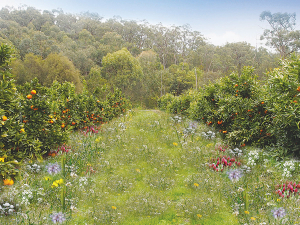Pick-your-own becomes new floral trend
As the summer wedding season picks up, a new trend has come to the fore: Picking your own wedding flowers.
 A project in Gisborne is exploring an organic method of dealing with pests on citrus orchards by understorey planting of flowers to attract beneficial insects.
A project in Gisborne is exploring an organic method of dealing with pests on citrus orchards by understorey planting of flowers to attract beneficial insects.
A Gisborne based project is exploring an organic method of dealing with pests on citrus orchards by understorey planting to attract beneficial insects.
The two-year project is part of a $27 million, seven-year programme called A Lighter Touch, backed by the horticulture industry and Government through the Ministry for Primary Industries’ (MPI) Sustainable Food and Fibre Futures fund. It aims to shift the focus from traditional crop protection by conducting research, understanding crop protection products, and integrating biological and ecological processes into food production in New Zealand.
“Leaving bare earth under citrus trees and intensively mowing the strips between orchard rows may become a thing of the past as we revolutionise our approach through strategic planting,” says A Lighter Touch project manager Jeff Smith.
“Ranging from flowering perennials [clovers, alyssum] to annuals [buckwheat, phacelia] we’ve undertaken trials planting under and beside the trees. These plants and others may hold the key to enhance our agroecosystem and provide resources for beneficial insects to thrive which would reduce the need for applications of chemicals.”
The project has brought in researchers from Lincoln University and Plant & Food Research who extensively reviewed current literature on how to plant to attract the natural enemies of our most persistent pests. The researchers are now translating theory into practice.
“We’re testing to see what works under New Zealand conditions,” says Smith. “Seeds were planted late last year on two trial sites – one in a valley and one on the plains – alongside two control sites.”
The plains planting struggled to establish but the valley planting was more successful.
“This was because there was more rainfall in the valley and the landowner also had sheep which trampled seed into the soil.
“In future we may look at autumn sowing to see if we can achieve more consistent establishment.”
Smith says the programme is regularly collecting data on the trial and control sites including fortnightly monitoring for insect presence and species.
“By spring we’ll be able to evaluate how effective the planting has been in the first year… We’ve found that so many growers want to find a better way of planting, with less reliance on chemicals. While citrus was chosen for the model system, our findings should be adaptable for other perennial growing systems.”
Norwood has announced the opening of a new Tasman dealership at Richmond near Nelson next month.
Buying or building a rural or semi-rural property? Make sure you know where the wastewater goes, says Environment Canterbury.
With collars on more than seven million cows worldwide, Nedap says its standalone launch into New Zealand represents world-leading, reliable and proven smart technology solutions for dairy farmers.
The Meat Industry Association (MIA) is once again looking for game-changing ideas for New Zealand's red meat processing and exporting sector.
Environment Southland is inviting feedback on two bylaws that play a critical role in safeguarding the region's waterways and ensuring the safety of the local community.
While the North Island is inundated with rain, Southland is facing receding water levels as warm weather and lack of rainfall continues.

OPINION: Meanwhile, red blooded Northland politician Matua Shane Jones has provided one of the most telling quotes of the year…
OPINION: This old mutt has been around for a few years now and it seems these ‘once in 100-year’ weather…